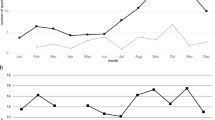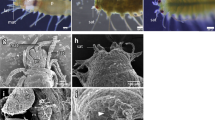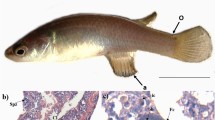Abstract
IN relation to the origin of the non-parasitic brook lampreys the view now generally accepted is that these forms have arisen from closely related parasitic species by virtue of a precocious development of the gonads1–3. As a result, sexual maturity is attained so soon after metamorphosis that the migratory, parasitic phase has been eliminated from the life-cycle. The recent discovery of neotenous female ammocœtes of the Italian brook lamprey, L. zanandreai Vladykov4, tends to support the view that brook lampreys show an inherent tendency towards pædomorphosis.
This is a preview of subscription content, access via your institution
Access options
Subscribe to this journal
Receive 51 print issues and online access
$199.00 per year
only $3.90 per issue
Buy this article
- Purchase on Springer Link
- Instant access to full article PDF
Prices may be subject to local taxes which are calculated during checkout
Similar content being viewed by others
References
Zanandrea, G., Nature, 184, 380 (1959).
Leach, J. W., J. Morph., 89, 217 (1951).
Young, J. Z., “The Life of Vertebrates” (Oxford, 1950).
Zanandrea, G., 179, 925 (1957).
Hardisty, M. W., Nature, 167, 38 (1951).
Author information
Authors and Affiliations
Rights and permissions
About this article
Cite this article
HARDISTY, M. Development of the Gonads in Parasitic and Non-Parasitic Lampreys. Nature 187, 341–342 (1960). https://doi.org/10.1038/187341a0
Issue Date:
DOI: https://doi.org/10.1038/187341a0
Comments
By submitting a comment you agree to abide by our Terms and Community Guidelines. If you find something abusive or that does not comply with our terms or guidelines please flag it as inappropriate.



